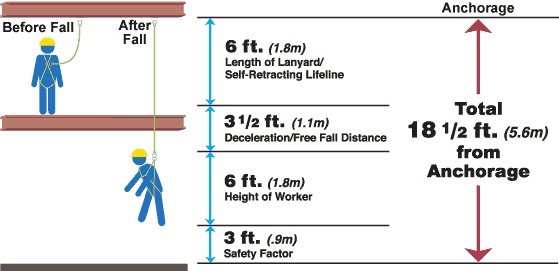- Posts: 9
- Thank you received: 0
Fall Protection Clearance Distance
- Dylan Hardison
- Offline
- New Member
-

Calculating PFAS Clearance Distance
Personal Fall Arrest Systems (PFAS) must be used in accordance with the following OSHA requirements:
OSHA Construction Standard 1926.501 (b)(1) "Each employee on a walking/working surface (horizontal and vertical surface) with an unprotected side or edge which is 6 feet (1.8 m) or more above a lower level shall be protected from falling by the use of guardrail systems, safety net systems, or personal fall arrest systems."
OSHA Construction Standard 1926.502 (d)(16) "Personal fall arrest systems, when stopping a fall, shall: limit maximum arresting force on an employee to 1,800 pounds when used with a body harness; be rigged such that an employee can neither free fall more than 6 feet, nor contact any lower level; bring an employee to a complete stop and limit maximum deceleration distance an employee travels to 3.5 feet; and, have sufficient strength to withstand twice the potential impact energy of an employee free falling a distance of 6 feet, or the free fall distance permitted by the system, whichever is less."
It is important that employees be trained in calculating PFAS clearance distance. In the event of a fall it is important to ensure that the worker will not free fall more than 6 feet. Free falling more than 6 feet has broken workers necks from impact force. If workers contact lower levels the PFAS is useless. Use a deceleration device to ensure forces do not exceed 1,800 pounds. Use this chart from when calculating PFAS clearance distance.

Questions to start discussion:
1) What could happen if you free fall more than 6 feet?
2) How do you know if you will contact a lower level in the event of a fall?
3) How do you calculate clearance distance when the anchor is at my feet?
Photo Courtesy of: https://www.millerfallprotection.com/smart-solutions/connecting-devices/calculating-fall-clearance-3
Please Log in or Create an account to join the conversation.